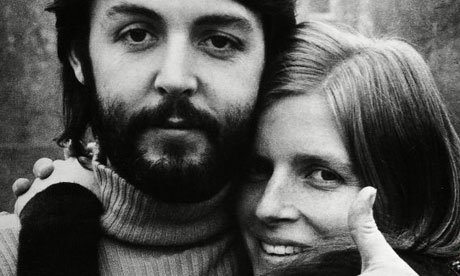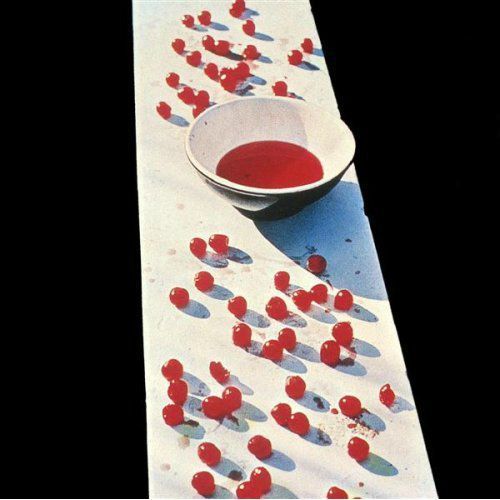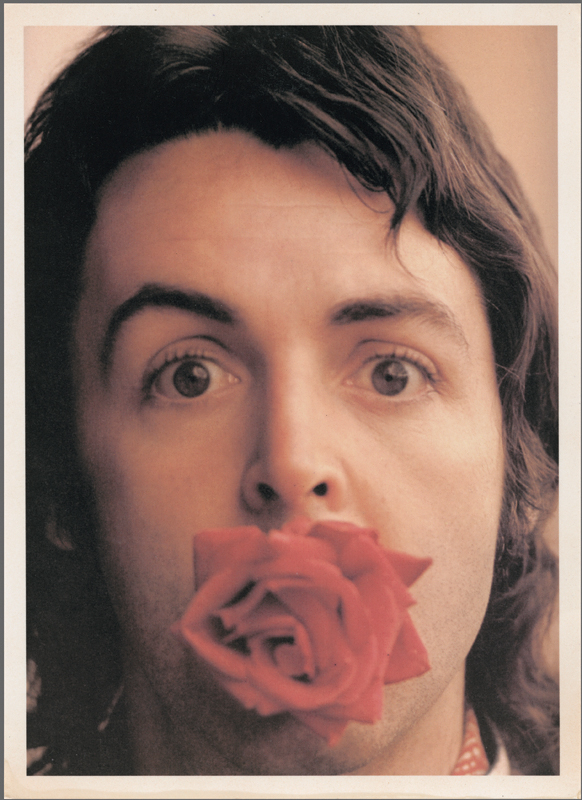Paul Alone
It's said when Alexander the Great, as a young man (he never got to be an old man), saw the breadth of his empire he wept for there were no more worlds to conquer. Paul McCartney must have felt the same way in late 1969, at 27 years old. The Beatles had conquered the world half a decade before and had only solidified their grip since, and Paul, from humble beginnings, had lived more during those years than most do in a lifetime.
But the band was breaking apart and Paul didn't know what to do. Could he start all over again? Daunting, to say the least. He was almost catatonic. He retreated to an unfinished home in Scotland, his confidence shattered, and wondered what to do next. If his wife Linda hadn't been by him, puffing him up, he may have become a recluse.
That's just the start of Tom Doyle's book Man On The Run: Paul McCartney In The 1970s. When I picked it up, I wondered why? There are tons of books about the Beatles and about Paul, so why one that concentrates on this decade. While Doyle never fully answers the question, it is true that Paul's first decade after the Beatles is his most interesting, and most artistically satisfying.
Paul had suggested, as a last measure, that the Beatles go out on the road anonymously and play small venues. John thought he was daft. By late 1969, the band was a going concern only as a money-making venture--they weren't making any more music together. And the big fight was who would represent them. John, George and Ringo went with Allen Klein, an alleged tough guy who would fight to get as much money for them as possible. But Paul was wary, and went with his father-in-law Lee Eastman. The Beatles were already fighting, but this was the final straw, and Paul was now the official bad guy. Later Klein would go to jail for various questionable activities, so Paul was probably right, but for now the three Beatles were suing the Cute One.
While it was clear they were breaking up, Paul became the first to officially acknowledge it in a 1970 self-interview he included with his first solo album, McCartney. It was a small, simple, homemade album with some beautiful tunes and some oddities. It included "Maybe I'm Amazed," which has gone on to achieve classic status. One thing about Paul--even on his weakest work, there was always something special. And another thing (starting with "Another Day")--beginning in 1971, no matter how spotty his musical record was, he always managed to release at least one top ten single a year throughout the decade, often a #1.
Next came Ram, another mixed effort. While John was releasing raw, powerful work, and George was finally free to put out whole albums of his songs, many of which he'd stored up, Paul still seemed to be messing around. Nevertheless, he had a #1 hit with "Uncle Albert/Admiral Halsey" as well as a vague shot at Lennon with "Too Many People." It wasn't long before Lennon responded, scathingly, in both interviews and songs.
Paul decided to start a new band, Wings. The truth is, it was always Paul and whoever backed him--which included the not especially musical Linda. As it was, the Wings changed the roster several times through the decade. Paul was just Paul, and Linda was more wife than Wing. The only true Wing who stayed in the lineup (through the 70s anyway) was ever-faithful Denny Laine, an old friend who sang for the Moody Blues back in the day.
Wings' 1971 debut, Wild Life, was probably the weakest effort of Paul's that decade. But Macca was just starting to come back to life. He and the band traveled in a van through England, following his old plan for the Beatles. They'd come to a town, locate the local college and tell them they'd put on a show (even if the band barely had enough material). Word started to spread and the crowds showed up, but the important thing was Paul was getting what he'd wanted for years.
In 1972, no album, but three singles. First the apolitical Beatle put out "Give Ireland Back To The Irish." Next there was their version of "Mary Had A Little Lamb." He finally returned to form with "Hi, Hi, Hi."
Meanwhile, Wings got a double decker bus and toured Europe (along with the McCartney kids, who must have had quite a childhood, as mom and dad generally took them everywhere). This was still not a grand tour, but the venues were bigger. Paul was also busted for pot--the first time, but it was the beginning of a series of such busts, ultimately leading at the end of the decade to being held in jail in Japan and sent back before he could tour there. Apparently life without pot was unimaginable to him. (While this may not be the greatest thing, it was the harder stuff throughout the decade that really damaged the band.)
Wings' next album, Red Rose Speedway, was another weak outing, though it sold decently on the strength of the dreary #1 hit "My Love." But Paul was about to get on a streak of solid albums that showed the world he hadn't lost it. In fact, he was, chart-wise, one of the most successful acts of the 70s.
First, and most important, was Band On The Run, recorded by Paul, Linda and Denny (the rest of the band quit) in dangerous Lagos. Paul thought it would be fun, and EMI had a studio there. It's probably his best album and certainly his best-selling. He followed it up with three original albums that showed off his revitalized songwriting: Venus And Mars, Wings At The Speed Of Sound and London Town. In-between he did a huge, highly successful tour of America--turned into the successful live album Wings Over America. (Paul also did "Mull Of Kintyre" around this time, the biggest-selling single ever in Britain and a ridiculous misfire in America.)
During this period, he made up with John. John was going through a tough time, living a wild life in Los Angeles, separated from Yoko. Paul came out west and actually gave John a message from his wife about how she'd take him back if he proved himself. John did as told and the couple reunited. A bit later, the couples--Paul and Linda and John and Yoko--hung out in the Dakota. They actually watched the famous SNL bit in the mid-70s where producer Lorne Michaels promised to pay the Beatles $3000 if they'd come together. This was being taped only a mile or so away, and the duo joked about showing up, but nothing came of it.
John became a bit more reclusive soon and start bad-mouthing Paul once again. It's not entirely clear why. John was always the moody type, and it's also possible he was envious of Paul's new prominence.
Paul had nothing left to prove, but he always had a strong work ethic (and need to perform) and put out some solo albums as Wings petered out and died by the early 80s. His next two albums, Back To The Egg and McCartney II, didn't compare to his recent run (luckily he'd signed a major contract just before Egg), but they have their moments. And, good or bad, Paul was always trying out new sounds, as demonstrated by "Goodnight Tonight," "Wonderful Christmastime" and "Coming Up."
Then John was murdered in late 1980 and Paul was devastated. The killing closed out the 70s as surely as the Beatles breaking up had closed out the 60s. At least Paul got to find out in that in John's final days he had been saying nice things about his erstwhile partner. The Beatles, after their tempers cooled down, had actually played with each other in almost every combination throughout the 70s--there'd always been rumors all four would finally get back together, but now the dream was over.
Paul continued to be a successful performer, but I'm not sure if he ever mattered again. He still goes out on major tours, but he's now a nostalgia act. Back in the 70s, the audience wanted to hear his recent hits (though they also loved Beatles numbers); now if he plays anything from the last twenty years, it's time for a bathroom break. But Paul is probably the greatest living songwriter, and that can't be bad.






7 Comments:
I like McCartney and love a lot of his stuff but these defined my school years
Say Say Say
Ebony & Ivory
Temporary Secretary
Pipes of Peace
Greatest living songwriter, eh? I suppose that's okay, just so long as you remember that Neil Diamond is America's greatest living songwriter-performer of this or any generation.
Does the book touch on McCartney's collaborative phase? I suppose that really is the 80s, with Michael Jackson, Stevie Wonder and so on, but I would like to read something on how those came about. I'm requestingthe Doyle book for my Birthday!
Anon: Are you British, because "Pipes Of Peace" meant a lot more over there than here. (The I didn't think "Temporary Secretary" meant anything to anyone.)
Denver Guy: If you want to find out about those collaborations you'll have to wait for a sequel.
Neil Diamond isn't even in the top two songwriters named Neil. That would be Young and Sedaka.
Nice reprise of the apocryphal Ringo line.
Pure 'murrican with good teeth no extra "u" s.
Pipes of Peace got heavy rotation on MTV
Post a Comment
<< Home